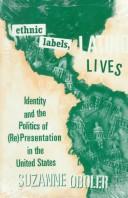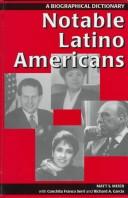| Listing 1 - 10 of 194 | << page >> |
Sort by
|
Periodical
ISSN: 15433315 Publisher: Hanover, N.H. Dartmouth College Library
Abstract | Keywords | Export | Availability | Bookmark
 Loading...
Loading...Choose an application
- Reference Manager
- EndNote
- RefWorks (Direct export to RefWorks)
Hispanic Americans --- Hispanic Americans. --- Hispanics (United States) --- Latino Americans --- Latinos (United States) --- Latinxs --- Spanish Americans in the United States --- Spanish-speaking people (United States) --- Spanish-surnamed people (United States) --- Ethnology --- Latin Americans --- Spanish Americans (Latin America)

ISBN: 0816622868 0816622841 Year: 2002 Publisher: Minneapolis (Minn.): University of Minnesota
Abstract | Keywords | Export | Availability | Bookmark
 Loading...
Loading...Choose an application
- Reference Manager
- EndNote
- RefWorks (Direct export to RefWorks)
Hispanic Americans --- Hispanics (United States) --- Latino Americans --- Latinos (United States) --- Spanish Americans in the United States --- Spanish-speaking people (United States) --- Spanish-surnamed people (United States) --- Ethnology --- Latin Americans --- Spanish Americans (Latin America) --- Ethnic identity --- Name --- Ethnic identity. --- Name. --- Latinxs
Periodical
ISSN: 25768344 Year: 1931 Publisher: New York : Casa de las Españas, Columbia University,
Abstract | Keywords | Export | Availability | Bookmark
 Loading...
Loading...Choose an application
- Reference Manager
- EndNote
- RefWorks (Direct export to RefWorks)
Hispanic Americans. --- Hispanics (United States) --- Latino Americans --- Latinos (United States) --- Spanish Americans in the United States --- Spanish-speaking people (United States) --- Spanish-surnamed people (United States) --- Hispanic Americans --- Ethnology --- Latin Americans --- Spanish Americans (Latin America) --- Latinxs

ISBN: 9780313291050 058538908X 9780585389080 0313291055 0313005559 9780313005558 9798400692185 Year: 1997 Publisher: Westport, Conn. : Greenwood Press,
Abstract | Keywords | Export | Availability | Bookmark
 Loading...
Loading...Choose an application
- Reference Manager
- EndNote
- RefWorks (Direct export to RefWorks)
Hispanics --- Latijns-Amerikanen --- Biografie --- Woordenboeken --- Hispanic Americans --- Hispanics (United States) --- Latino Americans --- Latinos (United States) --- Latinxs --- Spanish Americans in the United States --- Spanish-speaking people (United States) --- Spanish-surnamed people (United States) --- Ethnology --- Latin Americans --- Spanish Americans (Latin America)
Book
ISBN: 0822978393 9780822978398 9780822962014 0822962012 Year: 2012 Publisher: Pittsburgh, Pa. University of Pittsburgh Press
Abstract | Keywords | Export | Availability | Bookmark
 Loading...
Loading...Choose an application
- Reference Manager
- EndNote
- RefWorks (Direct export to RefWorks)
Cuban Americans --- Hispanic Americans --- Hispanics (United States) --- Latino Americans --- Latinos (United States) --- Latinxs --- Spanish Americans in the United States --- Spanish-speaking people (United States) --- Spanish-surnamed people (United States) --- Ethnology --- Latin Americans --- Spanish Americans (Latin America) --- Cubans
Book
ISBN: 1593326904 9781593326906 9781593324681 1593324685 Year: 2011 Publisher: El Paso [Tex.] LFB Scholarly Pub.
Abstract | Keywords | Export | Availability | Bookmark
 Loading...
Loading...Choose an application
- Reference Manager
- EndNote
- RefWorks (Direct export to RefWorks)
Negron examines how New York City Latinos negotiate between multiple ethnic identifications. She finds no one-to-one relationship between biographical ethnicity and the use of language and other ethnic markers. Through linguistic flexibility, cross-cultural fluency, and negotiating aspects of personal image, individuals deploy ethnicity in creative and unexpected ways. The reasons for switching ethnic categories range from the relatively minor (getting free drinks), to the quotidian (connecting with friends), to the vital (making a sale). Negron's work calls into question the validity of ethno
Hispanic Americans --- Hispanics (United States) --- Latino Americans --- Latinos (United States) --- Latinxs --- Spanish Americans in the United States --- Spanish-speaking people (United States) --- Spanish-surnamed people (United States) --- Ethnology --- Latin Americans --- Spanish Americans (Latin America) --- Ethnic identity. --- Languages. --- Cultural assimilation.
Book
ISBN: 1469607670 1469612720 9781469612720 9781469607665 1469607662 1469627264 9798890843524 9798893130478 Year: 2013 Publisher: Chapel Hill
Abstract | Keywords | Export | Availability | Bookmark
 Loading...
Loading...Choose an application
- Reference Manager
- EndNote
- RefWorks (Direct export to RefWorks)
Born in an explosive boom and built through distinct economic networks, San Francisco has a cosmopolitan character that often masks the challenges migrants faced to create community in the city by the bay. Latin American migrants have been part of the city's story since its beginning. Charting the development of a hybrid Latino identity forged through struggle-- latinidad --from the Gold Rush through the civil rights era, Tomas F. Summers Sandoval Jr. chronicles the rise of San Francisco's diverse community of Latin American migrants. This latinidad , Summers Sandoval shows, was formed and mad
Hispanic Americans --- Hispanics (United States) --- Latino Americans --- Latinos (United States) --- Latinxs --- Spanish Americans in the United States --- Spanish-speaking people (United States) --- Spanish-surnamed people (United States) --- Ethnology --- Latin Americans --- Spanish Americans (Latin America) --- History.
Book
ISBN: 1283009404 9786613009401 0739146505 9780739146507 9780739146484 0739146483 9781283009409 6613009407 Year: 2011 Publisher: Lanham, Md. Lexington Books
Abstract | Keywords | Export | Availability | Bookmark
 Loading...
Loading...Choose an application
- Reference Manager
- EndNote
- RefWorks (Direct export to RefWorks)
Voz, or voice, thematically structures the twelve original essays of Latina/o Discourse in Vernacular Spaces. This collection extends the study of Latina/o communication, in particular vernacular expressions covering a wide array of inquiries. The essays address such diverse topics as foundational developments, the intersection of culture, theory and disciplinarity, challenges to prevailing ideas about belonging and citizenship, identity tensions in latinidad, marginality, and nationalism, and voices that demonstrate possibilities for solidarity, redefinition and reclamations.
Hispanic Americans --- Bilingualism --- Hispanic American communication --- Hispanics (United States) --- Latino Americans --- Latinos (United States) --- Latinxs --- Spanish Americans in the United States --- Spanish-speaking people (United States) --- Spanish-surnamed people (United States) --- Ethnology --- Latin Americans --- Spanish Americans (Latin America) --- Language. --- Communication.
Book
ISBN: 1536130753 9781536130751 9781536130744 1536130745 Year: 2018 Publisher: New York
Abstract | Keywords | Export | Availability | Bookmark
 Loading...
Loading...Choose an application
- Reference Manager
- EndNote
- RefWorks (Direct export to RefWorks)
Latinos in the 21st Century: Their Voices and Lived Experiences opens with the presentation of a study consisting of written surveys, focus groups, and individual interviews with 58 men and women who were seeking employment through the Malibu Community Labor Exchange (MCLE) at the time of the study and were predominantly Hispanic immigrants. A central aim of this study is to develop an understanding of how Spanish-speaking Hispanic immigrant day laborers have fared financially in the aftermath of the economic crisis of 2007-2008, while also providing insights on the important role that a labor exchange, such as the MCLE, plays in the financial wellbeing of Hispanic immigrant workers. Additionally, the use of a narrative approach to facilitating therapeutic conversations as a model for understanding and empowering Latinas and their lived experiences. The resiliency and strengths of Latina immigrants in adapting and coping with resettlement in a new country are also addressed. Next, the authors present an analysis usiung 2015 American Community Survey data to explore the determinants of homeownership among Cuban-Americans in the U.S. Homeownership is an important wealth-generating mechanism and access to it can determine the future socio-economic standing of the second generation and beyond. Drawing insights from the literatures on systemic racism and assimilation, this analysis tests two competing theories of homeownership stratification among Cuban-Americans. The final chapter focuses on the Latino migrant worker experience in the United States and its impact on their living conditions. Latino migrant workers (LMWs) constitute a paradigmatic case of a population subject to structural vulnerability. The authors argue that the dysfunctional U.S. immigration system creates a system of structural vulnerability which generates precarious circumstances in LMWs' everyday lives and health status.
Hispanic Americans --- Hispanics (United States) --- Latino Americans --- Latinos (United States) --- Latinxs --- Spanish Americans in the United States --- Spanish-speaking people (United States) --- Spanish-surnamed people (United States) --- Ethnology --- Latin Americans --- Spanish Americans (Latin America) --- Attitudes.
Book
ISBN: 162895101X 160917321X 9781609173210 9781628961010 1628961015 9781611860290 1611860296 Year: 2012 Publisher: East Lansing, Mich. Michigan State University Press
Abstract | Keywords | Export | Availability | Bookmark
 Loading...
Loading...Choose an application
- Reference Manager
- EndNote
- RefWorks (Direct export to RefWorks)
Much knowledge and understanding can be generated from the experiences of everyday life. In this engaging study, Alvin O. Korte examines how this concept applies to Spanish-speaking peoples adapted to a particular locale, specifically the Hispanos and Hispanas of northern New Mexico. Drawing on social philosopher Alfred Schutz's theory of typification, Korte looks at how meaning and identity are crafted by quotidian activities. Incorporating phenomenological and ethnomethodological strategies, the author investigates several aspects of local Hispano culture, including the oral tradition, leav
Hispanic Americans --- Hispanics (United States) --- Latino Americans --- Latinos (United States) --- Latinxs --- Spanish Americans in the United States --- Spanish-speaking people (United States) --- Spanish-surnamed people (United States) --- Ethnology --- Latin Americans --- Spanish Americans (Latin America) --- Social life and customs.
| Listing 1 - 10 of 194 | << page >> |
Sort by
|

 Search
Search Feedback
Feedback About UniCat
About UniCat  Help
Help News
News